The price of the knock down
- Published
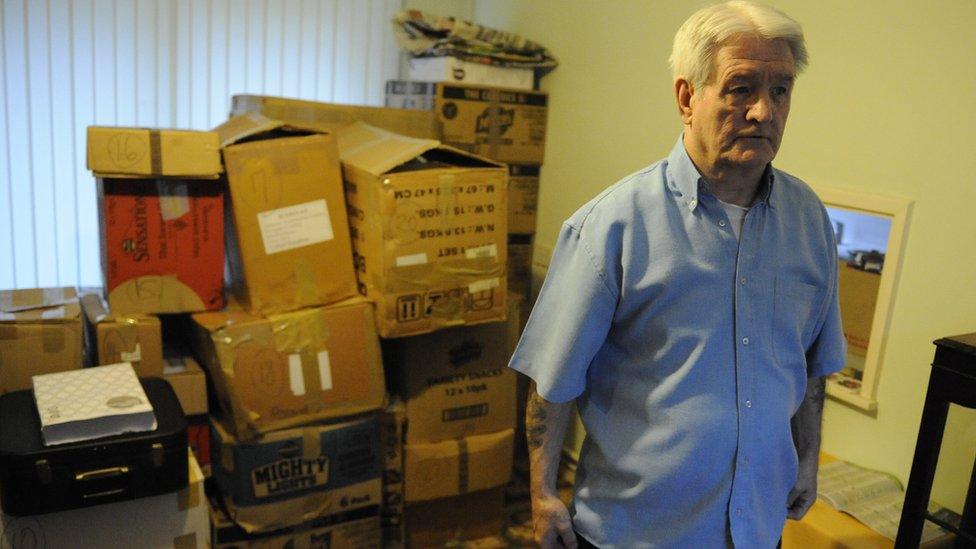
Alfred Hampson has his boxes packed for when he has to move out
In a two-bed bungalow on a council estate in north-east London, Alfred Hampson is waiting to find out when the bulldozers are coming. But his opposition to plans to redevelop the estate is just part of the story of how the UK deals with its housing crisis.
"I've been here 20 years and I'm quite happy," Mr Hampson says. "I'm being thrown out of home - that's how I look at it."
The 79-year-old is surrounded by cardboard boxes he packed when he was told the Marlowe Road Estate was due to be demolished.
It was built in the 1960s when state intervention in housing provision was at its peak. Since then, the overall rate of house building in the UK has collapsed, with fewer than 150,000 homes being built per year by the start of this decade.
One solution backed by successive governments has been to knock down council estates in London, where the housing squeeze is at its most severe, and use private contractors to rebuild many more properties.
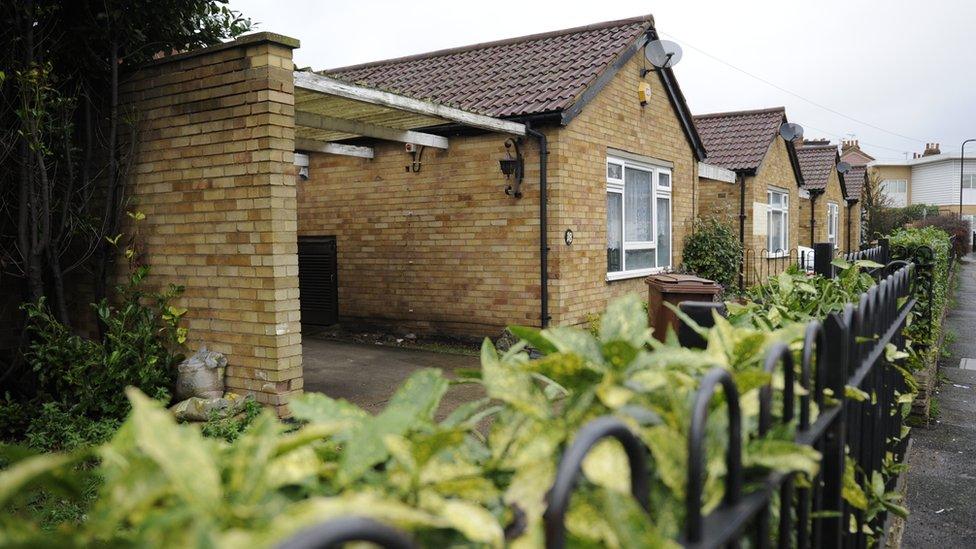
Alfred Hampson's bungalow will be demolished when the estate is redeveloped
The developer Countryside is spending £130m rebuilding Marlowe Road,, external where around 200 properties will be demolished and replaced with more than 430 new homes.
Its agreement with the London borough of Waltham Forest means 150 of the new properties will be council-owned, compared to the current figure of 166.
To many, it is the kind of scheme that represents a strong practical solution to the housing crisis - private enterprise renewing social housing whilst also alleviating Britain's woeful housing shortage with new privately-owned properties on the same land.
The move is endorsed by the Department for Communities and Local Government (DCLG), which says it "applauds" Waltham Forest for its approach in regenerating "run down estates".
Others believe projects such as these deliver the minimum possible in social housing whilst using prime land for new homes available only to the wealthy in a London house price boom.
Newly built three-bedroom homes on the Marlowe Road Estate will attract a value of at least £660,000 according to the developer.
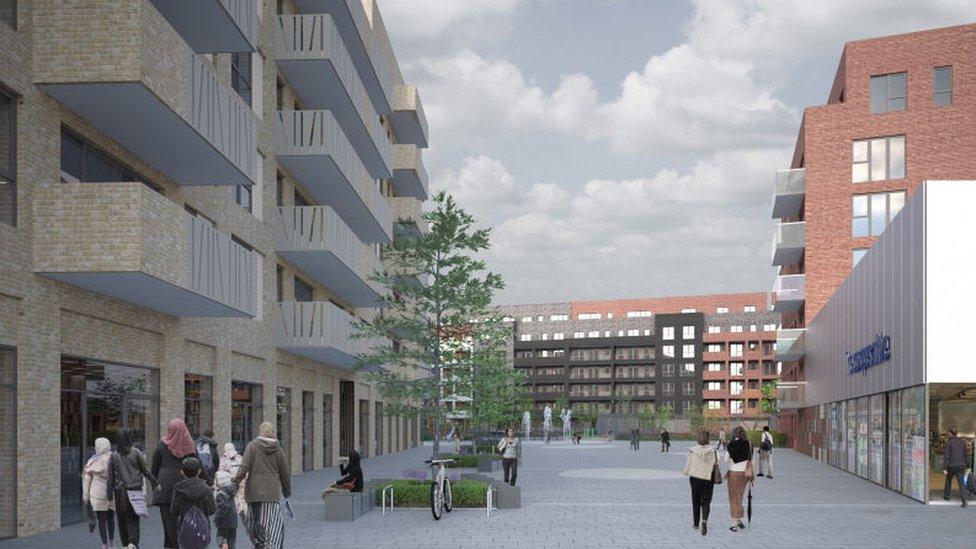
The council are confident that the redevelopment will prove popular
The reduction in the number of council-owned properties means only a third of the estate will be social housing, which Waltham Forest accepts is well below its target of 50% affordable housing for new developments.
The council's planning approval document says this is the only way the project will be economically "viable".
Redevelopment it is usually a "sensitive" process, according to John Stewart from the Home Builders Federation, which represents property developers.
"The scheme has to be viable in the round. It has to be worthwhile a developer redeveloping a scheme, obviously, because if it isn't they won't do the scheme," he says.
Mr Hampson, who points out he will soon be 80, says he has been offered temporary accommodation four miles further out in London while the building work is carried out but he does not want to move.
"These are solid buildings and there's nothing wrong with them whatsoever," he says.
He has been told he will be offered a new council home when the estate is redeveloped.
The local authority says no council tenants will have to leave, but some have chosen to do so and have had to enter a bidding process competing for properties elsewhere in the borough.

Regeneration and demolition
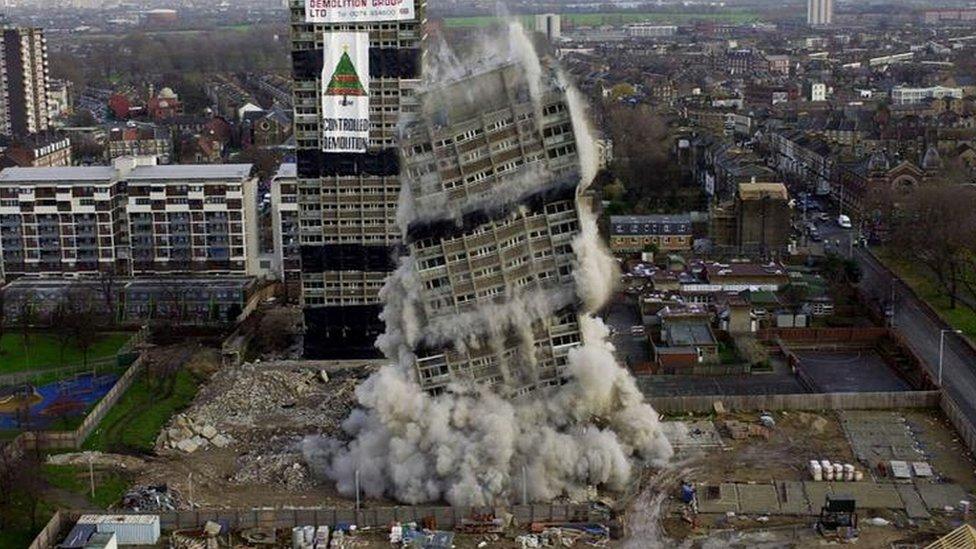
The government wants to increase the number of homes on large, deprived housing estates
The DCLG says almost £300m is available to deliver 6,000 more homes through regeneration projects
They say "best practice" should follow the advice of George Clarke's Empty Homes Review, external which found that demolition of existing homes is a "last option"
"Refurbishing and upgrading existing homes should always be the first and preferred option" according to the review and "proper community consultation" should take place if demolition may be necessary.

The demolition and rebuilding of estates is "fracturing communities" according to Loretta Lees, professor of human geography at the University of Leicester.
She says there are cases where council estate residents bought their homes under the Right to Buy scheme introduced in the 1980s but have had to sell their properties back to councils at a low price ahead of demolition - a claim contested by local authorities.
"People who have worked three or four jobs to pay off their mortgage are now left with a property that they are being given below market value for," she says.
"Literally they are being displaced outside of London because they cannot afford to come back to what will be redeveloped here or indeed anywhere else locally."
Some former homeowners have moved to the north of England or to seaside towns like Hastings or Margate in Kent, she says.
Back on the Marlowe Road Estate, the local authority says 80% of survey respondents answered "yes" to a question offering the "opportunity" of redevelopment.
Waltham Forest Councillor Khevyn Limbajee says the finished estate will be "amazing" with "high-quality homes".
"We are going to provide 150 council homes - that's a big amount of council homes... but at the same time provide at least 20 shared ownership homes as well as a lot more homes for sale."
He says the development will help subsidise the council's "ambitious" plans to build 2,000 council homes in the borough in the next five years.

Housing Britain

Interactive: Where can I afford to live?
In video: What the average price will buy you
Q&A: Why are starter homes controversial?
Magazine: Why do people resent buy-to-letters

- Published8 September 2014
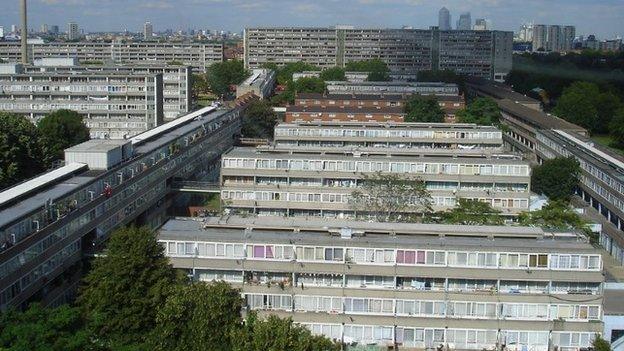
- Published9 July 2020
